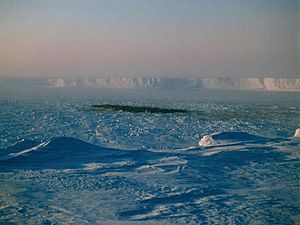Halley Bay facts for kids
Halley Bay was a special place in Antarctica. It was located on the edge of the Brunt Ice Shelf in an area called Coats Land. This bay was important for two main reasons: it was home to a large group of emperor penguins, and it was near where the British Halley Research Stations were built.
Contents
What Was Halley Bay?
Halley Bay wasn't a fixed bay like one you might find on a map. It was actually a temporary bay formed by the fast ice. Fast ice is sea ice that is attached to the land or to an ice shelf. The original Halley Bay doesn't exist anymore. However, new bays often form and break off in the same area. This happens as huge chunks of the ice shelf break away and become icebergs.
Home to Penguins
Halley Bay was once a very important spot for wildlife. It was named an Important Bird Area (IBA) by BirdLife International. This was because it supported a huge breeding colony of emperor penguins. In 2009, scientists estimated there were about 22,500 penguins living there. This made it one of the largest emperor penguin colonies.
Why the Penguins Moved
Sadly, the penguin colony at Halley Bay faced big problems. Starting around 2016, the sea ice that the penguins needed to breed on began to fail. This means the ice wasn't strong enough or didn't last long enough. Emperor penguins need stable sea ice to lay their eggs and raise their chicks. Because the ice kept breaking up, the penguins had to leave. By 2019, the large colony had moved away to find safer places to live.
The Halley Research Station
The British Halley Research Stations were built close to this area. These stations are important for scientists studying Antarctica's weather, climate, and atmosphere. They are named after the bay, even though the bay itself changes over time.
The Changing Ice Shelf
The Brunt Ice Shelf is a massive sheet of ice. It is always slowly moving towards the sea. Eventually, large parts of it break off into the ocean. This process is called "calving." The Brunt Ice Shelf is currently getting ready for a very large calving event. When this happens, the coastline will change a lot. The original location of Halley Bay will then be many kilometers out at sea. This shows how much the icy landscape of Antarctica can change.


